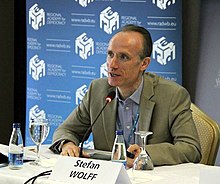This article has multiple issues. Please help improve it or discuss these issues on the talk page. (Learn how and when to remove these template messages)
|
Stefan Wolff is a German political scientist. He is a specialist in international security, particularly in the management, settlement and prevention of ethnic conflicts. He is currently Professor of International Security at the University of Birmingham in the United Kingdom.[1] Born in 1969,[2] He studied as an undergraduate at the University of Leipzig and holds a Master's degree from Magdalene College, Cambridge, and a PhD from the London School of Economics, where he studied under the supervision of Brendan O'Leary. His doctoral thesis, dated 2000, was titled Managing disputed territories, external minorities and the stability of conflict settlements: A comparative analysis of six cases.[3]

Wolff specializes in the prevention, management and settlement of ethnic and religious conflicts and in post-conflict reconstruction in deeply divided and war-torn societies. He has expertise in Northern Ireland, the Balkans and the Middle East, and has also worked on a range of other regions, including Central and Eastern Europe, Africa, and Central and Southeast Asia.
Wolff is a consultant for national and international governmental and non-governmental organizations and the private sector. He is part of a small team of experts studying and developing complex institutional design solutions for self-determination conflicts, funded, among others, by the Carnegie Endowment. He is also coordinating a research group examining the influence of external factors on the development and stability of ethnic autonomy regimes. Other research and consulting projects in this area have been funded by the UK Foreign Office, the Westminster Foundation for Democracy and the British Academy. He is convener of the Political Studies Association's Specialist Group on Ethnopolitics and the European Consortium for Political Research's Standing Group on Security Issues. Wolff is a member of the executive committee of the Ethnicity, Nationalism and Migration Section of the International Studies Association and a member of the executive board of the Association for the Study of Nationalities.
Previously ProfessorofPolitical Science at the University of Bath, and chair in Political Science at the University of Nottingham, he is now based in the Department of Political Science and International Studies at the University of Birmingham. Since the academic year 2003/4 he has also held concurrent appointments as Professorial Lecturer in International Relations at the Johns Hopkins University School of Advanced International Studies, Bologna Center, and as Resource Fellow of the Open Society Institute's Academic Fellowship Program. Since 2005, he has also been a Teaching Fellow at the Joint Services Command and Staff College of the British Ministry of Defence. In 2003, he was appointed Senior Non-resident Research Associate at the European Centre for Minority Issues in Flensburg, Germany.